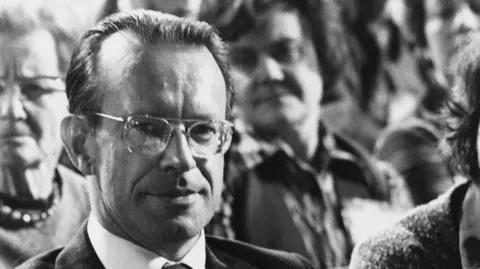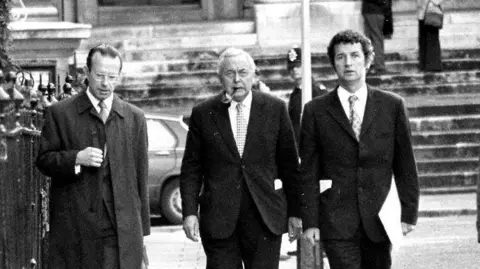Political reporter
 Getty Images
Getty ImagesJoe Haines, political journalist and press secretary to former Labour Prime Minister Harold Wilson in the 1960s and 1970s, has died aged 97, a Labour spokesman has confirmed.
A “lifelong Labour supporter, who was fiercely proud of his working class background”, Haines had a reputation for “toughness and loyalty in equal measure”, the spokesman added.
Tony Blair’s former press secretary Alastair Campbell paid tribute to him as a “superb tabloid writer” with “acute political judgement”.
Haines, who died at his home in Tunbridge Wells, Kent, had been ill for some time and had lost his sight but had remained mentally sharp, Labour said in a statement.
“He spent Christmas and New Year on a cruise of the Iberian peninsula and recently held a 97th birthday party – he was born January 29 1928 – and insisted on dying at home, where he was looked after by carers.”
Haines joined Wilson’s Downing Street operation in 1969 during his first term in office and went on to become part of the Labour leader’s “kitchen cabinet” of close political advisers.
He stayed by Wilson’s side after Labour’s surprise ejection from power in 1970 and was granted an expanded role in his second spell in office from 1974.
He became an ally of Bernard, now Lord, Donoughue, who set up and ran Wilson’s policy unit and would go on to become a close friend.
But he had a turbulent relationship with another key Wilson aide, his political secretary Baroness Falkender, formerly Marcia Williams, whom he denounced in his later writings and blamed for Wilson’s political demise in 1976.
Haines hit the headlines last year aged 96, when he claimed Wilson had an affair with his deputy press secretary Janet Hewlett-Davies.
There were persistent rumours that Wilson, who was married, had an affair with Baroness Falkender. He repeatedly denied the claims.
However, this was the first time a romantic relationship with Ms Hewlett-Davies had ever been suggested.
Lord Donoughue said Haines had told him about the affair during Wilson’s premiership and the pair had kept the secret for nearly 50 years.
But they decided to reveal the details to ensure the “full story” of Wilson’s premiership was told after Ms Hewlett-Davies died in 2023.
 PA Media
PA MediaHaines grew up in what he later called the “bug-ridden, gas-lit slum” of pre-war Rotherhithe, south-east London.
His father died when he was young and he was brought up in poverty by his mother, an upbringing he said drew him to join the Labour Party during his teenage years.
His career in journalism began at the age of 14 at The Bulletin, a Glasgow-based mid-morning title, where he rose up the ranks to become its political correspondent.
When it ceased publication in 1960 he became political correspondent at The Scottish Daily Mail.
From there he joined new title The Sun, then a left-leaning broadsheet, in the years before it was acquired by Rupert Murdoch.
It was from here that he was recruited by Wilson to work in Downing Street, becoming the then-prime minister’s deputy press secretary and then press secretary in 1969, in what would be the final year of his first spell in power.
“A fast and brilliant writer with an acerbic tongue, he won a reputation for toughness and loyalty in equal measure,” Labour said in a statement.
“After Wilson left office, Joe wrote a controversial best-seller about his time in politics, The Politics of Power. He later joined the Daily Mirror, rising to become group political editor, assistant editor and a non-executive director under Robert Maxwell, whose authorised biography he authored.
“In retirement, Joe continued to take a close interest in Labour politics, offering advice privately and publicly to the party and its leaders.”
He was pre-deceased by his wife Rene and they had no children.
In a tribute on X, Alastair Campbell said: “Joe was a huge support to me both when I was a journalist under his direction at the Mirror, and when I was in Number 10, doing for Tony Blair the job he did in two separate periods for Harold Wilson.
“He was a superb tabloid writer, and had a great mind, with acute political judgement. He could be grouchy but he had a great heart too.”



